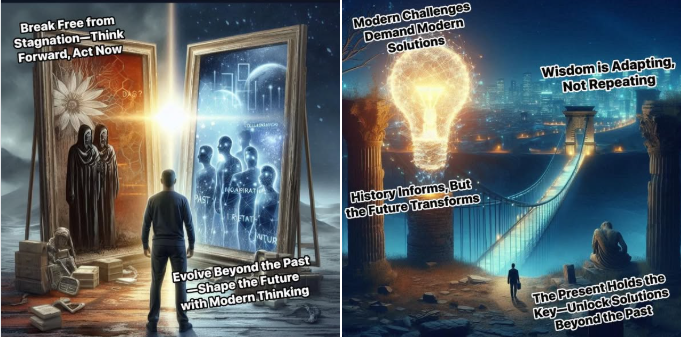
Kavi had always been a keen observer of human behavior, and during his interactions, he noticed another recurring pattern among some people—a tendency to think behind the times. These individuals clung to methods and ideas that once proved effective, even when they were rooted in negative actions such as war and terrorism. They believed that what was possible 30, 100 or even 1000 years ago—actions like forceful occupation that might have been legally or socially acceptable then—could be replicated today with the same results.
Kavi understood that this mindset was not limited to the realm of conflict. It extended into various aspects of life, where solutions to present problems were wrongly based on outdated paradigms. For instance, in the business world, some leaders still champion autocratic management practices, believing that the rigid hierarchies of the past are the key to success in today’s fast-paced environment. In education, a few traditionalists insist on rote memorization and strict discipline, dismissing innovative, student-centered learning methods that better prepare individuals for modern challenges. Even in social policy, certain groups advocate for regressive practices—holding on to archaic ideas about social order and power—that once dominated history but now only serve to hinder progress and inclusion.
Kavi noted that the core issue was a failure to recognize that the solution to a present problem must be based on the realities and the context of the present. Clinging to old methods only leads to stagnation and conflict, as the world around us evolves while outdated strategies remain stuck in the past.
The Framework for Modern Problem-Solving
Determined to guide his community toward a more forward-thinking approach, Kari proposed a framework to break free from the shackles of outdated thinking:
Recognize the Time Context:
- Understand the Era: Acknowledge that every action is context-dependent. What worked in a different era may not be applicable or ethical today.
Embrace Modernity:
- Innovative Solutions: Cultivate strategies that draw on contemporary knowledge, values, and ethical standards rather than relying on historical precedents.
Reject Outdated Negative Actions:
- Evolve Beyond the Past: Realize that methods like forceful occupation or regressive social policies, which might have been justified in a different time, are neither acceptable nor effective in the modern world.
Innovate and Adapt:
- Tailor to Today: Encourage creative problem-solving that addresses current challenges in business, education, social policy, and beyond. For example, modern management should foster collaboration and innovation, while education should nurture critical thinking and adaptability.
Learn from History, but Don’t Dwell on It:
- Guided by Lessons, Not Limitations: Use historical insights as valuable lessons rather than as strict blueprints for present action. The past can inform, but it should not dictate the future.
The Lasting Insight
Kavi’s observations served as a powerful reminder that progress requires a mindset firmly anchored in the present. The solutions to today’s problems must arise from an understanding of current circumstances and a commitment to innovation and ethical evolution. By shedding the weight of outdated practices, society can unlock its full potential, transforming challenges into opportunities and paving the way for a future built on modern wisdom and inclusive progress.
In embracing this forward-thinking framework, Kavi believed that we not only honor the lessons of history but also empower ourselves to create a dynamic and just society for tomorrow.

